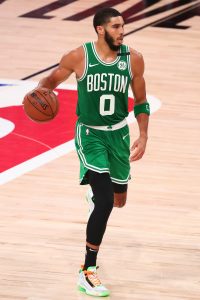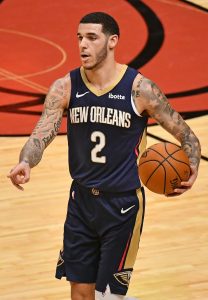The NBA’s annual deadline for rookie scale contract extensions passed on Monday, with a flurry of deals completed just before time ran out. In total, 10 players eligible for rookie scale extensions signed new contracts this year.
We’ve seen an uptick in rookie scale extensions over the last couple years, but 2020 still represents an impressive high water-mark after 2019 featured nine such extensions. The last time as many as 10 rookie scale extensions were completed in a single league year was back in 2006, when players like LeBron James, Carmelo Anthony, Dwyane Wade, and Chris Bosh were signing their second NBA contracts.
Here’s a breakdown of the 10 rookie scale extensions signed before this year’s deadline, sorted by total value. In cases where we haven’t yet seen the official contract terms for the extension, we’re basing our figures on the latest reports. These deals will go into effect beginning in 2021/22:
- Donovan Mitchell (Jazz): Five years, maximum salary (story). Projected value of $163,000,590. Projected value can increase to $195,600,710 if Mitchell earns All-NBA honors in 2021. Includes fifth-year player option and 15% trade kicker.
 Jayson Tatum (Celtics): Five years, maximum salary (story). Projected value of $163,000,590. Projected value can increase to $195,600,710 if Tatum earns All-NBA honors in 2021. Includes fifth-year player option and 15% trade kicker.
Jayson Tatum (Celtics): Five years, maximum salary (story). Projected value of $163,000,590. Projected value can increase to $195,600,710 if Tatum earns All-NBA honors in 2021. Includes fifth-year player option and 15% trade kicker.- Bam Adebayo (Heat): Five years, maximum salary (story). Projected value of $163,000,590. Projected value can increase to $195,600,710 if Adebayo earns MVP honors in 2021 ($185,820,675 for All-NBA First Team; $179,300,645 for Defensive Player of the Year).
- De’Aaron Fox (Kings): Five years, maximum salary (story). Projected value of $163,000,590. Projected value can increase to $195,600,710 if Fox earns First Team All-NBA honors in 2021 ($182,560,660 for Second Team; $169,522,180 for Third Team).
- OG Anunoby (Raptors): Four years, $72,000,000 (story). Includes fourth-year player option.
- Derrick White (Spurs): Four years, $70,000,000 (story). Includes $5MM in incentives.
- Jonathan Isaac (Magic): Four years, $69,600,000 (story). Includes $10.4MM in incentives and Exhibit 3 injury protection.
- Luke Kennard (Clippers): Four years, $56,000,000 (story). Includes $8MM in incentives and a fourth-year team option.
- Markelle Fultz (Magic): Three years, $50,000,000 (story). Includes $3MM in incentives and partial guarantee in third year.
- Kyle Kuzma (Lakers): Three years, $39,000,000 (story). Includes third-year player option.
The first four extensions on this list were completed relatively early in the offseason and didn’t come as a surprise. Mitchell, Tatum, Adebayo, and Fox are considered crucial franchise building blocks for their respective teams, and there was no point in getting cute by waiting until the 2021 offseason to lock them up, since all four teams were prepared to offer the max.
The other six deals were arguably more interesting, since non-maximum-salary rookie scale extensions are generally trickier to negotiate.
The Spurs and Raptors, for instance, had to weigh how much they wanted to prioritize maximizing their cap room in 2021. Both teams cut into their projected room slightly by finalizing extensions with their respective fourth-year players, but that trade-off will be worth it if White and Anunoby have breakout seasons in 2020/21. Several other teams around the NBA will have significant cap room as well, and would’ve been in position to give those players more lucrative offer sheets.
The Lakers and Clippers each projected to be over the cap in 2021, so they were in position to negotiate new deals for their fourth-year players without really worrying about reducing their flexibility for next offseason.
While I don’t particularly love either Kennard’s or Kuzma’s new contract from a team perspective, I understand why each team felt compelled to act now. Kennard is an elite shooter who could’ve received offers in the range of Joe Harris (four years, $72MM) or Davis Bertans (five years, $80MM) if he stays healthy and has a nice year in Los Angeles. As for Kuzma, he’s only receiving a little more than the mid-level and it’s not a long commitment — that’s a relatively safe investment, and a deal he would’ve topped with a strong bounce-back 2020/21 season.
The Magic, meanwhile, completed perhaps the two most curious deals of the extension period, committing $80MM to Isaac, who will be out for the season with a torn ACL, and $50MM to Fultz, who has had one healthy season in the NBA and is a career 26.7% three-point shooter.
While Orlando may end up regretting one or both deals, I definitely don’t hate them. Isaac looked like a Defensive Player of the Year candidate before he got hurt last season, and would’ve been in line for a contract much closer to the max if he had stayed healthy. If the Magic feel good about his ability to make a full recovery, that deal will pay off in its later years.
As for Fultz, Orlando protected itself to some extent with a final-year team option, and frankly didn’t even give the former No. 1 pick that significant a raise — he’ll earn $12.3MM in the final year of his rookie contract in 2020/21. The contract isn’t long enough or expensive enough to ever become a real albatross if Fultz regresses or deals with more health issues. If he develops like the Magic believe he can – they reportedly feel as if he’s capable of become an “upper-echelon point guard” – it’ll be a bargain, though that’s a big if.
While 10 players signed rookie scale extensions, that leaves 13 players who were eligible for a new deal and didn’t get one (a 14th, T.J. Leaf, was waived by the Thunder on Saturday). Here’s the list of those players, who are now eligible to become restricted free agents during the 2021 offseason, assuming they finish their current contracts:
- Jarrett Allen (Nets)

- Lonzo Ball (Pelicans)
- Tony Bradley (Sixers)
- John Collins (Hawks)
- Zach Collins (Trail Blazers)
- Terrance Ferguson (Sixers)
- Josh Hart (Pelicans)
- Justin Jackson (Thunder)
- Lauri Markkanen (Bulls)
- Malik Monk (Hornets)
- Frank Ntilikina (Knicks)
- Dennis Smith Jr. (Knicks)
- D.J. Wilson (Bucks)
The most interesting names here are Allen, Ball, Collins (both of them), and Markkanen.
The lack of a new deal made some sense for Markkanen and the Collinses — the Bulls forward had a down year in 2019/20, while the Hawks‘ Collins missed 25 games due to a suspension and the Trail Blazers‘ Collins missed most of the season due to an ankle injury. All three players likely feel they can increase their value by staying on the court and playing to their full potential this season.
Ball also has an injury history, having missed some time in each of his three NBA seasons, so the Pelicans may have wanted another year to assess him — Ball’s agent Rich Paul also generally prefers to take his clients to free agency.
As for Allen, the Nets‘ financial situation may have played a part in the club’s decision to hold off on an extension. The team already has over $140MM in salaries on its books for 2021/22. Not extending Allen will also make it simpler to include him in a trade this season if the right deal arises. The poison pill provision would’ve applied if he’d inked a new contract, meaning he would’ve had significantly different outgoing and incoming cap figures, making salary-matching more challenging.
All of these players will be well positioned to land a big payday if they have big years in 2020/21, since there the 2021 free agent market lost plenty of talent due to all this year’s extensions and several teams still project to have big chunks of cap space.
Photos courtesy of USA Today Sports Images.
Don’t miss the last sentence. These offers may look small in comparison to 2021.
Yep, I bet the Knicks will be throwing a large offer at Malik Monk if he has even a halfway decent season. Possibly Lonzo Ball too.